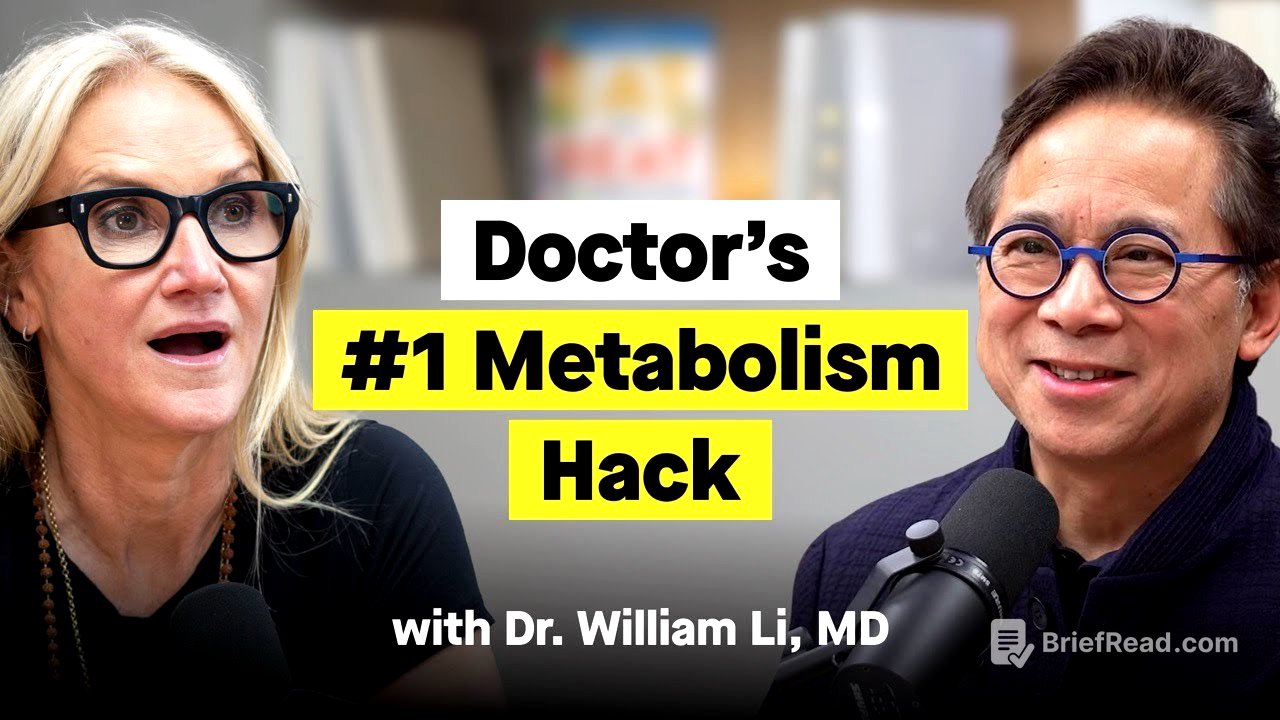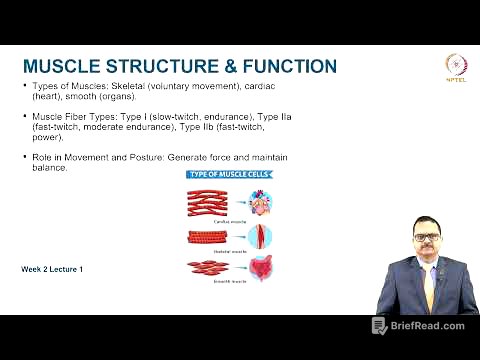TLDR;
Dr. William Lee explains the science of metabolism, aiming to help viewers understand how to lose weight, burn fat, and achieve better health. He debunks common myths about metabolism, such as the idea that everyone's metabolism is different or that it inevitably slows down with age. He emphasizes that metabolism is fundamentally the same for everyone and can be optimized by understanding how the body processes energy.
- Metabolism is how your body gets and burns energy, like a car using fuel.
- Common myths about metabolism are debunked using scientific research.
- Metabolism remains stable from ages 20 to 60, challenging the notion of inevitable decline.
- Weight gain often starts with visceral fat accumulation, including in the tongue.
- Reactivating metabolism involves intermittent fasting, exercise, stress reduction, portion control, and high-quality food choices.
Meet the Guest [0:00]
Dr. William Lee, a renowned physician and scientist, discusses the science of metabolism. His work has significantly impacted the prevention, treatment, and reversal of diseases such as cancer, obesity, heart disease, and diabetes. The discussion aims to provide simple steps to unlock the power of one's metabolism, helping individuals lose weight, burn fat, and achieve better health.
What is Metabolism? [2:30]
Metabolism is how the body obtains and uses energy, similar to how a car uses fuel. Just as a car needs fuel to run, the body needs food, measured in calories, to function. The quality of the fuel (food) matters; choosing high-quality foods provides better long-term benefits for the body, similar to using high-quality gasoline in a car.
The 4 Biggest Misconceptions About Metabolism [6:28]
Dr. Lee debunks several common myths about metabolism. The first myth is that everyone's metabolism is different; in reality, everyone is born with the same basic metabolic system. The second myth is that teenagers have sky-high metabolisms. The third myth is that metabolism automatically slows down in middle age. The fourth myth is that a slow metabolism causes weight gain; instead, excess body fat slows metabolism.
How Your Metabolism Changes Over a Lifetime [13:49]
A comprehensive study by Herman Ponzer at Duke University, involving 6,000 people across 20 countries, revealed four phases of metabolism throughout life. Phase one (0-1 year) shows metabolism skyrocketing. Phase two (1-20 years) involves metabolism gradually decreasing to adult levels. Phase three (20-60 years) shows a stable metabolism. Phase four (60-90 years) shows a slight decrease of about 17%. This study, which adjusted for body fat, demonstrates that metabolism remains consistent for most of adulthood.
What Triggers Weight Gain Inside Your Body [22:30]
Weight gain often starts with the accumulation of visceral fat, which is the fat inside the body that you can't see. The first place people tend to accumulate fat is in the tongue, specifically the back of the tongue. A sign of this is snoring, as the fat in the tongue relaxes and obstructs the airways during sleep.
What Quietly Slows Down Your Metabolism [25:52]
Several factors can slow down metabolism, including alcohol consumption, which affects hormones and sleep quality, and chronic stress, which keeps the body in a constant fight-or-flight mode, hindering fat burning. Life events and stress in the 40s and 50s often lead to decreased exercise and increased stress, impacting metabolism.
How to Reactivate a Slow Metabolism [35:10]
To reactivate a slow metabolism, Dr. Lee recommends intermittent fasting, which helps the body switch to burning fat. He also advises getting regular exercise, even just walking, and reducing stress by focusing on positive thoughts. Additionally, he suggests practicing portion control by not overeating and choosing high-quality foods.
3 Foods That Support a Healthy Metabolism [37:43]
Dr. Lee recommends three foods to support a healthy metabolism: beans, which feed the gut microbiome; tomatoes, which contain lycopene to burn harmful body fat; and onions, which contain quercetin to activate brown fat. He also notes that capers are packed with quercetin, which helps burn bad fat and activate taste buds.
Let Go of Calorie Counting and Food Stress [40:12]
Dr. Lee advises against obsessively counting calories, as it can cause stress that counteracts weight loss efforts. Instead, he suggests working with a nutritionist to create a personalized plan based on individual lifestyle and goals. He emphasizes focusing on ingredients that fight body fat and trusting the body's natural ability to burn fat.









